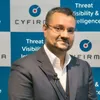Cybersecurity startup Aristi Labs eyes foreign markets after M&A deal
Bhopal-based cybersecurity startup Aristi Labs in June 2020 signed a deal with Portuguese company Exploit Hunters. Aristi, which offers security solutions to help businesses protect data and intellectual property, now wants to expand across the US and European markets.
Increasing digitisation has led to in a rise in cybercrimes and data breach attacks. Several media reports say cybersecurity attacks and breaches in India increased by as much as 500 percent since the COVID-19 lockdown was announced in March 2020.
And startups are working overtime to help solve the cybersecurity problem.
Bhopal-based cybersecurity startup , which provides comprehensive security solutions to help businesses protect data and intellectual property, is now looking to ramp up and scale its business in foreign markets.

Credit: Utkarsh Bhargava is now Co-founder and CTO of Portugal-based Exploit Hunters.
Founded in 2016 by Utkarsh Bhargava, the startup's core product Securign provides a security information and event management platform (SIEM) to help businesses with threat detection capabilities across cloud and on-premises landscape. It aims to help businesses eliminate security blind spots and regain its control on shadow IT.
Earlier this month, the startup announced a merger-and-acquisition deal with Portugal-based cybersecurity startup Exploit Hunters.
Speaking to YourStory, Utkarsh said Aristi would now be known as Exploit Hunters and he would join the board as Co-founder and CTO. The entire Aristi Lab team would move to Exploit Hunters as a part of this deal.
The merger-and-acquisition deal
Utkarsh explained that technical operations of Exploit Hunters will now take place in India from Bhopal. The deal will also allow Aristi to expand its services in the US and Europe markets, including Porto in Portugal, Portland and Oregon in the US, and Sao Paulo in Brazil.
“We are planning to set up a state-of-the-art cybersecurity operations and research centre in Bhopal. We also plan to hire over 350 cybersecurity professionals in the city by the end of this year,” Utkarsh said.
He added that while getting adequate talent in Bhopal was challenging, the startup aimed to attract talentfrom across the country by offering attractive salaries similar to the range available in metro cities. The idea is “to make Bhopal the cybersecurity hub of India”.
Utkarsh refused to disclose financial details, but said the companies were in talks in January. The deal fell through then because both parties were extremely busy.
“After the lockdown due to COVID-19 outbreak, both sides got a break and resumed talks about the merger-and-acquisition deal,” he added.
In the beginning
Utkarsh said he worked as a cybersecurity analyst till 2016. After leaving his job due to personal reasons, he freelanced for companies in India, Saudi Arabia, and Europe. He had completed his BTech degree from The Institution of Engineers (India).
During this time, he came to know about the General Data Protection Regulation (GDPR) guidelines, under which companies need to report cybersecurity attacks to data protection authorities in Europe within 72 hours.
“Some of my clients reached out to me asking about software that could help them identify cyber attacks as 72 hours was a short period of time. This identification can only be done using a SIEM solution. While the software was already available in the market, it was extremely expensive.
“The lowest SIEM solution could be priced at $30,000 per year, and that too only for 10 to 15 units. I realised that existing companies were not able to help small and medium businesses,” Utkarsh said.
He then began working on Securign, a SIEM software priced lower than existing solutions to help small and medium-sized businesses. The first version of the product was launched in April 2018.
The SIEM software keeps a check on the computer processors and networks, and sends immediate alerts in case of any malicious activity to protect data assets.
Utkarsh added the software also monitored all activities being done all on computers by employees. This would help organisations keep track of external cyber threats and cyber attacks from insiders.
The business and future plans
The founder said the idea was to target small and medium-sized businesses with around 10 to 20 computer units. In such cases, the SIEM software would cost around $500 to $1,000 per month depending on the infrastructure.
The product has now been scaled up to provide SIEM along with Security Operations Centre (SOC)solutions to businesses.
The business began with an aim to target small and medium businesses, but following the Exploit Hunters deal, the company will now also target big organisations, Utkarsh said.
Aristi, which counts the Indian Army as one of its clients for Securign software, is now targeting banks in Europe and the US.
Three variants of the SIEM+ SOC solutions are available at present. Users can take a monthly subscription of the Night Watch variant, which starts at $4,995 per month and supports up to 100 units (monitoring them from Monday to Friday from 6 pm to 9 pm).
The other options include World Class with a subscription rate starting at $7,995 per month (24x7 monitoring for 100 computer units). The Titanium variant, priced at $14,995 per month, includes all features of the World Class variant along with 24x7 support, threat intelligence, cortex threat analytics, and proactive threat hunting.
According to a report by PwC, the Indian cybersecurity market is projected to reach $3.05 billion by 2022, at a compound annual growth rate (CAGR) of 15.6 percent.
Similar services are provided by US-based Securonix which, has offices in Bengaluru and Pune.
Utkarsh said the startup was bootstrapped and did not have any immediate plans of seeking funding. . However, they will eventually raise funds to scale further.
Speaking about future plans, Utkarsh said: “After one year, we will be researching on Zero Trust Security Architecture( ZTA). It is the future of cybersecurity and in the next five years almost every organisation will need to deploy ZTA to protect their digital assets from modern cyber threats such as APT (Advanced Persistent Threat).”
(Edited by Teja Lele Desai)






